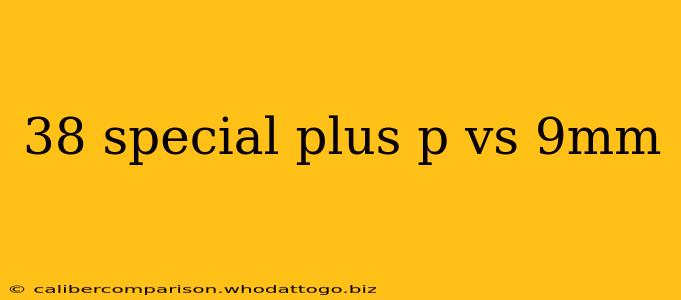Choosing the right cartridge for self-defense or concealed carry is a critical decision. Two popular options frequently debated are the .38 Special +P and the 9mm. This detailed comparison will delve into the ballistics, recoil, capacity, availability, and overall suitability of each cartridge to help you make an informed choice.
Ballistics: Power and Penetration
The core difference lies in their ballistic performance. The .38 Special +P, while a powerful round for its size, generally delivers less energy and penetration than the 9mm.
-
.38 Special +P: The "+P" designation indicates a higher pressure load than standard .38 Special ammunition. This translates to increased velocity and energy, but still typically falls short of the 9mm's performance in terms of stopping power. Its relatively larger diameter bullet can, however, create a larger wound cavity.
-
9mm: The 9mm Parabellum boasts significantly higher velocity and energy, leading to greater penetration and stopping power. Modern 9mm ammunition offers a wide variety of bullet weights and designs, allowing for customization based on specific needs and preferences. This versatility is a key advantage.
Penetration and Expansion: A Crucial Detail
While raw energy is important, bullet expansion and penetration depth are equally crucial for effective self-defense. A bullet that over-penetrates can pose a risk to innocent bystanders, while one that fails to expand adequately may not deliver sufficient stopping power. Both calibers offer ammunition designed for optimal expansion, but careful selection is paramount.
Recoil and Shootability
Recoil is a significant factor for many shooters, especially those new to firearms or with smaller builds.
-
.38 Special +P: Generally considered milder-recoiling than the 9mm, making it potentially more comfortable for practice and extended shooting sessions. This can lead to better accuracy, particularly for less experienced shooters.
-
9mm: Exhibits more noticeable recoil than the .38 Special +P. However, modern 9mm firearms are often designed to mitigate this recoil effectively, making it manageable even for smaller individuals.
Capacity: Rounds Per Magazine
Magazine capacity is a crucial factor in self-defense situations.
-
.38 Special +P: Revolvers, the typical firearm platform for .38 Special +P, typically hold 5 or 6 rounds. While some larger revolvers exist, the capacity is inherently limited compared to semi-automatic pistols.
-
9mm: Semi-automatic pistols chambered in 9mm offer significantly higher magazine capacities, ranging from 10 to 17 rounds or more. This increased capacity provides a greater margin of safety in potentially dangerous encounters.
Availability and Cost: Ammunition Considerations
Both .38 Special +P and 9mm ammunition are widely available, though availability can fluctuate depending on market conditions and demand. Generally speaking, 9mm ammunition tends to be more readily available and often less expensive than .38 Special +P.
Conclusion: Choosing the Right Cartridge
The "best" cartridge depends heavily on individual needs and priorities. The .38 Special +P offers manageable recoil and is suitable for smaller-framed individuals or those prioritizing reduced recoil. However, its lower capacity and less potent ballistics compared to the 9mm should be carefully considered. The 9mm provides superior stopping power, higher capacity, and wider ammunition availability, making it a popular choice for self-defense and concealed carry. Ultimately, the choice should be made after careful consideration of your individual physical capabilities, experience level, and specific self-defense needs. It is crucial to practice extensively with your chosen firearm and ammunition to ensure proficiency and confidence.

